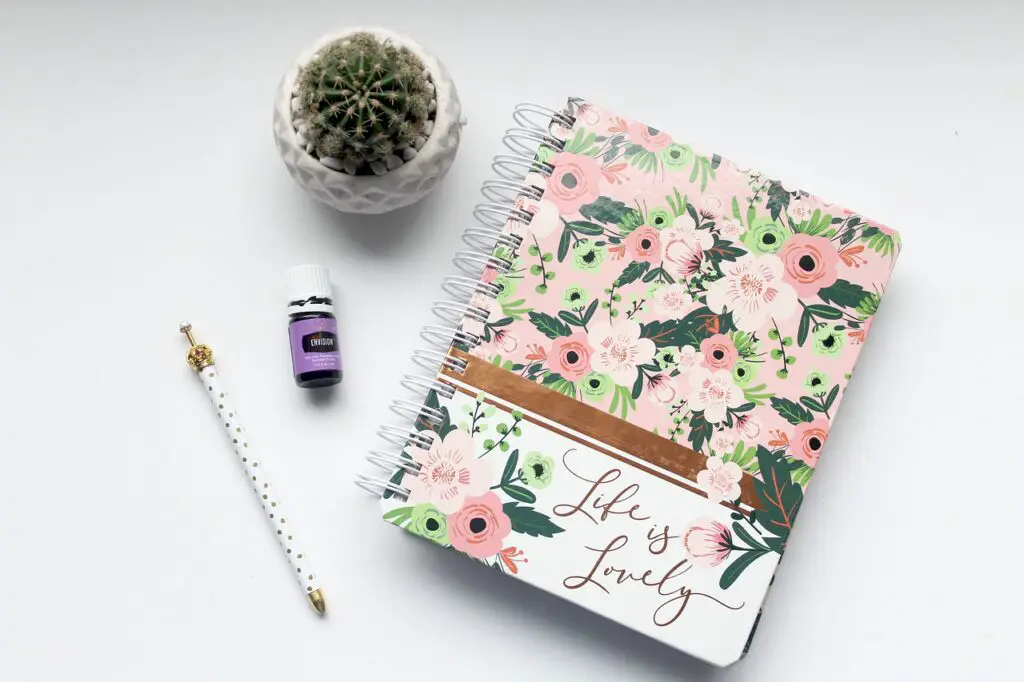With all the content that we constantly consume everyday — all the pictures we see on Instagram, the news we hear, the blogs we read, the Netflix videos we watch and probably a thousand other things — our brain hardly gets time to process and retain all this information. According to a report published by researchers at the University of California, the average American consumes about 34 gigabytes of data and information each day — an increase of about 350 percent over nearly three decades. While a conscious mind can only process 50 bits per second. Therefore, it is important to find time during the day to let your mind ‘be’, to sit with your thoughts and process them, helping to declutter your mind. The most effective way to do this is journaling.
‘We used to visit the Internet, Now we live here.’
Journaling is the best way to declutter our mind from all these bits and pieces of information. To analyse how we feel about certain things what are we consuming consciously or unconsciously, What did we learn from all of it and to filter out the important stuff. It is a way to evaluate your entire day. You need to make it a habit to sit down and analyse every action you took, every thought you had, any media that you consumed and dig deeper into each one of them to understand yourself better. Our brain needs time to process things, now more than ever.
As the saying goes,
It can be hard to see the forest, for the trees.
When we’re busy, we’re consumed by our daily tasks and it’s easy to lose sight of what’s important. Journaling helps combat this short-sightedness by encouraging us to step back and consider the big picture.

Also, living through a global pandemic has messed with our mental and emotional health in countless ways. If you’re looking for ways to cope up, journaling is your therapy. Many of us tend to ignore or suppress our difficult emotions. Journaling helps us to ‘get acquainted with‘ these feelings, so that we’re able to process them and move forward. It might be uncomfortable for a lot of us to ‘be with’ our feelings, but you eventually find out that you’re capable of dealing with them. A 2011 study highlighted the positive impact journaling had on adolescents who struggled with worry and self-doubt.
Journaling is basically the solution to everything concerning your mind. Here are a few ways in which you can use journaling to transform your life.
1. Planning
Journaling always helps in making a better action plan whether you have a hundred tasks at hand or you want to prioritise important things in your schedule. It helps you in creating a monthly, weekly or daily plans. A journal practice increases productivity and reduces the stress, as you have a definite plan to tackle the day. It helps you in approaching the day proactively instead of just waking up and putting out fires all day. You can also make to-do lists and the tick off the things as you get them done.
One way to plan your days ahead is — every morning or the night before — start with listing out all your tasks for the day. Next, figure out the three most important tasks that you need to complete no matter what. And then focus on completing them first. Once they get done, you can focus on other tasks at hand. Often we spend our entire day being busy in completing things that are not even a priority at that moment. Planning ahead helps you avoid such scenarios. A journal is a great place to capture all the things you need to do so that you can begin to prioritize and plan them.
2. Visualising Your Goals
Journaling also helps in goal setting and is a powerful tool to help you achieve your goals. A study was done of the graduating classes at Harvard University. 3% of the class journaled, and the other 97% did not. Ten years after graduation they documented the graduates personal success. The graduates in the 3% group that journaled were more success than the other 97% combined.

Our thoughts are abstract. Writing them down on a paper makes them physical. It makes it easier for our brain to create a plan for achieving these goals. As soon as you write your goals your brain starts seeing them as real. It helps us to analyse our goals in a better way. Goal setting is best done via journaling. It helps you to set clear goals and proper time frames for them. Journaling helps visualize them better — to every little details as much as possible.
3. Journaling Track Your Overall Development
Life happens, and it can happen fast. Sometimes we don’t take the time to stop and look around at what’s happening to us at each moment. Journal writing allows you to see how you’ve changed over time, so you can see where you did things right, and where you took a misstep and fell, allowing yourself to learn from your mistakes.
Keeping a journal can help you to track your progress, and is especially valuable when it comes to holding yourself accountable. Journaling allows you to let down your walls, be honest with yourself, and eventually will let you reflect and see just how far you’ve come. Journals Track Your Overall Development ; When you journal daily, you are easily able to figure out the places where you are falling short and the places that you need to work on. You can also maintain a habit tracker to track your everyday habits, you start holding yourself accountable if you don’t follow through everyday. I tried this method and it helps you in getting a friendly reminder each day.
4. Dealing With Anxiety and Worry
When you’re stressed about something, overthinking only makes it worse. You tend to create the worst case scenarios in your head, that are very unlikely to happen in real life. Writing your thoughts down on paper can help you to reduce your anxiety. Because writing helps you to slow down your thoughts and also allows your brain to assess them better. Rob Dial, a mindset mentor, provides a 4 step formula to remove anxiety using journaling.
If you’re feeling stressed. Take a piece of paper and write your thoughts down. When you start penning down your thoughts, your brain starts finding solutions to the problems. Ask yourself questions like — how are you feeling? Why are you feeling that? What’s the worse possible outcome? What’s the best possible outcome? — Answering these questions will make you realise that mostly, the situation is not as bad as you think it is, in your head. Of course, if your anxiety gets really bad, it’s best to seek for professional help. But in most situations, writing your thoughts on a journal puts your mind at ease. Your negative thoughts are similar to bacteria. When you keep them in the dark recesses of your mind, they grow. By writing about them, you shine a light on them which causes them to shrink.
5. To Figure Out Your Emotions
Similar to dealing with stress and anxiety, whenever you’re feeling overwhelmed with your emotions and you don’t seem to figure out the reason — the best way to deal is via Journaling. Just grab a notebook and start writing everything that’s on your mind. Don’t judge it. Chances are, you’ll figure out exactly what triggered these emotions and you’ll be able to process them better. This method of journaling is regarded as Brain Dump — where you pen down everything inside your head without any particular theme.

Often, we tend to suppress our emotions until they burst out, causing harm for our own self. Therefore, it’s better to process them and create awareness. With a journal, it is not uncommon that as you are capturing your thoughts, new awareness is being created. If you have a problem, start writing and you’ll find an answer. Or just start asking yourself questions and you’ll eventually start to unravel the reason behind these over emotional phases.
6. Journal Helps you connect to your values
The main goal of Journaling is to create more self awareness. As you start seeking for answers about who you truly are, What are your values, you start developing a clear picture of your true self. You figure out your values — what matters the most for you, what truly excites you, or if you are just falling for some false societal constructs — and that helps you in setting better goals for the future.
Journaling helps you in aligning your tasks and goals with your true self and live a more happier life. You need to be self aware and figure out your goals and values. This is because you must sort through the mental clutter and provide details on why you do what you do and feel what you feel. Writing in a journal engages a form of mindfulness. It is the mindfulness that helps you to feel more grounded.
7. Assessing Your Day Using Journaling
You can write down in your journal about the day and the events that occurred. This helps you in gaining some interesting insights that you otherwise would have missed in your busy day. It helps you filter out useful information, gather learnings from your mistakes and makes you better equipped for the next day. This helps you in making better routines for yourself by figuring out what is working for you the best. Journal also helps in gaining insights about your life patterns, the habits that you consciously or unconsciously repeat, that lead to similar outcomes.
Whenever you have a problem and write about it in a journal, you transfer the problem from your head to the paper. This empties the mind, allowing allocation of precious resources to problem-solving rather than problem-storing.
8. Journaling Facilitates Personal growth
When you use a journal to track your goals, it’s easier for you to assess them. It helps you see your accomplishments and that gives you more confident. And notice your shortcomings and gather learning from it. When you go back to your goals and find that you have achieved some of them, sometimes even higher, it motivates you. The best thing about journal writing is that no matter what you end up writing about, it’s hard to not grow from it. whether it’s about achieving goals, becoming a better person, or just general personal-development.
In the end..
Now, that you know the benefits of Journaling and how greatly it can impact your life. Grab a notebook or simply a paper, choose a method of journaling and get started with it.
Remember to keep it simple and leave Perfectionism at the door. There is no right or wrong way to use a journal. The key is allowing it to be your assistant in creating more space in your brain so that you can be your most productive self. Leave a comment down below if you are ready to join in on a journaling challenge!!

Pingback: How To Start A Journal Practice (Free Journal Prompts) - Kokumber
Pingback: How to Create Your Perfect Morning Routine - Kokumber
Pingback: How to Declutter Your Mind (Brain Dump Method) - Kokumber
Pingback: 7 Ways to Instantly Uplift Your Mood When Feeling Down - Kokumber
Pingback: 30 Journal Prompts To Deal With Stress And Anxiety – Kokumber